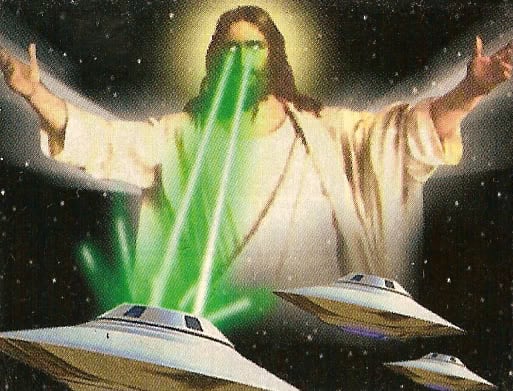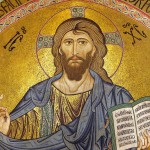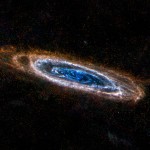Google “Jesus in space.” Go ahead, I dare you.
(No copyright because this is one of those eternal internet memes whose author is untraceable.)
Some of you who have been following me on Twitter for a while know that I’ve had misgivings about C.S. Lewis. The Narnia stories never attracted me and his non-fiction work seemed like middlebrow popularization of basic theology–not that there’s anything wrong with that, quite to the contrary (I sometimes think we need that more than we need academic theology) but not something I felt any urgent need to read. And if I’m honest I’ll admit that there might have been a bit of anti-Protestant prejudice.
But then I was clued in that his academic work on literature is excellent. And an even more dangerous thing happened: when I read The Allegory of Love I was exposed to Lewis’s utterly excellent prose. And it’s a very dangerous thing for me to know that an author is not only smart but an outstanding prose writer because then I might just buy and read a book of his–any book–on impulse just for the pleasure of reading it. Kindle is very efficient in that way.
Plus I’ve always felt that it was and is criminal that we don’t have more Christian science-fiction. Plus I’d always had a nagging feeling that one day I would have to read Lewis’ fiction myself to know for sure what it was worth, but I didn’t want to commit myself for Narnia.
All of which is a long-winded way of saying that I bought and read C.S. Lewis’ Space Trilogy over the weekend. And since it’s over 700 pages that alone will tell you that I liked it.
Some thoughts (it’s probably a misnomer to call it a review).
Out of the Silent Planet: this is clearly a masterpiece, and in my view it can only be as a result of prejudice that it’s not mentioned in the same breath as other towering SF classics as Foundation and Dune. The plot, the imagination, the setting, the characters, the weaving in of Christian themes, the “big reveal” of what the whole thing is about, all of it is clearly outstanding.
Perelandra: This was the most disappointing of the three, by far. I think I’ll just quote my tweets in reaction:
- “Out of the Silent Planet” was Christian art; “Perelandra” was a catechetical lecture disguised as art.
- Two chapters of boring & absurd action; two chapters of expository dialogue. And on and on.
- Also maybe the word “presently” needs to be used more sparingly than once per page.
- (Consequence of the Fall: every author has tics, and once you’ve noticed one you can’t unnotice it, and each time you see it you flinch.)
- There were also many good things to the book. The planet itself mainly. But, as I said, a letdown.
- If I hadn’t read the first book this one would have confirmed my prejudice of Lewis as a middlebrow auteur of thinly-disguised propaganda.
- I don’t want to be too harsh: I did stay glued to the book well past my bedtime.
I don’t know that I can say much more without spoiling the book. It was just very disappointing.
That Hideous Strength: this is clearly the strangest of the three. I really liked it. But it’s just not science-fiction. Apart from the fact that it occurs in the near future (relative to the time when it was written) and takes for granted the SF-y aspects of the previous book, there is nothing of SF in it. Almost everything out-of-the-ordinary that happens does so because of magic or other supernatural forces, and not whiz-bang technology; the entire action occurs within a twenty-mile radius in the middle of England. Of course, in some sense this is an artificial distinction–with few exceptions, the technology in SF books is about as “realistic” as wizards and dragons. Fair enough. But genre conventions do exist, and here Lewis abandons them with all-but the most perfunctory nod. (As he did not in Out of the Silent Planet: there is a spaceship, creatures encountered on the other planet have their characteristics as a result of evolution, and with one exception they have natural, not supernatural powers, and so on.)
Now, I don’t condemn the book for that reason. I can’t begrudge Lewis for writing the book he wanted to write rather than the book I wanted to read; I must take the book on its own terms and let it succeed or fail on that basis, and on its own terms it succeeds quite well. I dare even say that in pure literary terms it’s the best of the three: it’s certainly the one with the deepest, most complex and best-drawn characters; the plot, with its many interlocking subplots, is carried perfectly and strains belief only slightly and rarely. But it’s still nonetheless strange to expect spaceships and to be given a story about the knights of the round table (and not even the knights of the round table in space!).
The overall impression is that Lewis’s heart was never into science-fiction. He decided to get into it for some reason–maybe he perceived the same lack as I did, maybe he wanted a challenge, maybe he lost a bet–and poured all his ideas and energy into the first book (and it is a testament to his talent that it worked so well) and found out that he was completely out of steam by the end, unable to write another page of science-fiction. But, being British, he kept calm and carried on, and wrote an allegory for book #2 and a fantasy tale for book #3.
I guess what I’m trying to say is that these are good books, even occasionally books with greatness, but that apart from Out of the Silent Planet they do little to alleviate our sad lack of good Christian SF.













